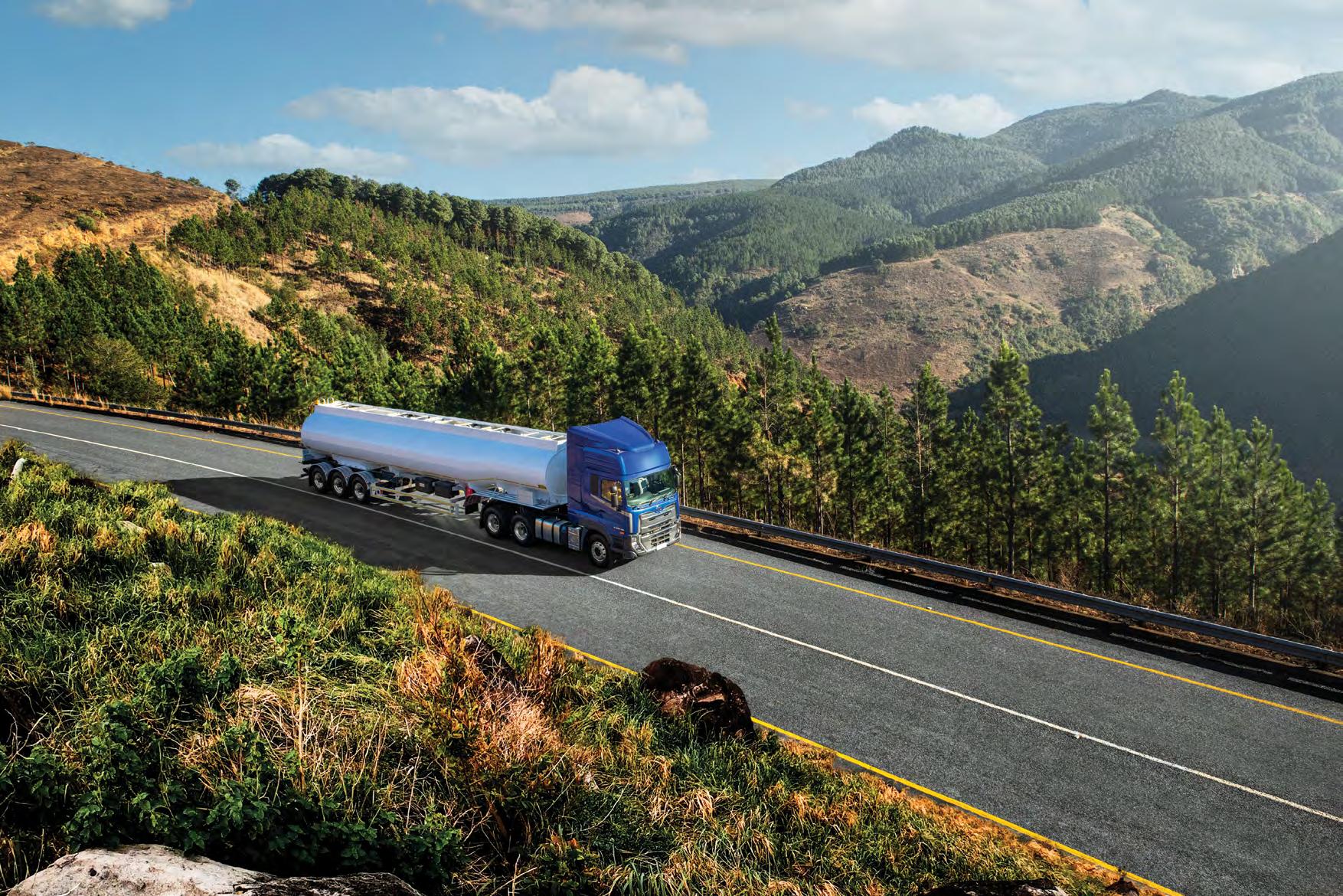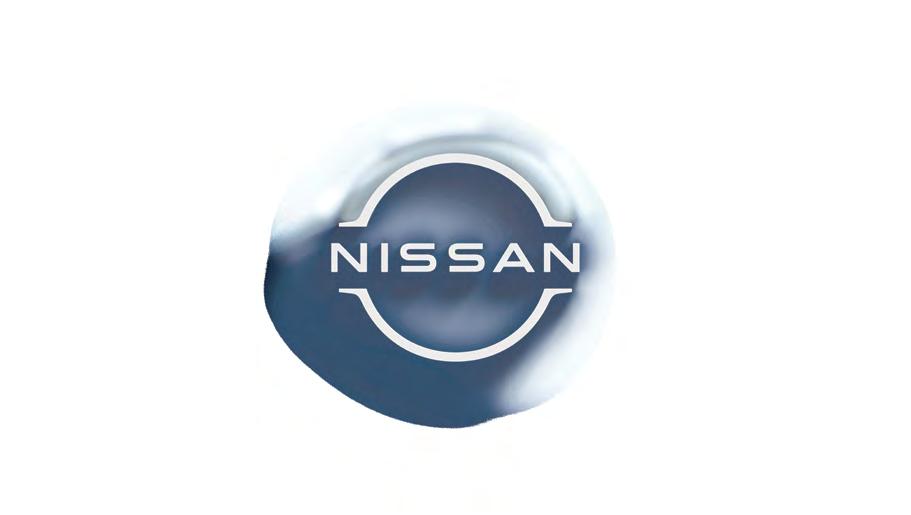E-COMMERCE
Inside the Momentum: Why Is Quiqup Scaling So Quickly?

CONNECTING TRADE PROFESSIONALS WITH INDUSTRY INTELLIGENCE
THE CEO PERSPECTIVE
Scaling with Soul
The Robots Are Here

E-COMMERCE
Inside the Momentum: Why Is Quiqup Scaling So Quickly?

CONNECTING TRADE PROFESSIONALS WITH INDUSTRY INTELLIGENCE
THE CEO PERSPECTIVE
Scaling with Soul
The Robots Are Here

New IVECO S-Way: high technology and efficiency on all missions
A wide choice of Euro III / V diesel engines, delivering class-leading power from 360 hp to 560 hp Euro III / 570 hp Euro V and superior fuel economy. 12-speed HI-TRONIX automated transmission with the most advanced technology in its category, electronic clutch and best-in-class torque-to-weight ratio. Full range of fuel-saving devices, such as anti-idling feature, EcoSwitch, Ecoroll and Smart Alternator. Top levels of comfort and safety, with a completely redesigned and reinforced cab, featuring enhanced direct visibility and enlarged cab livability.



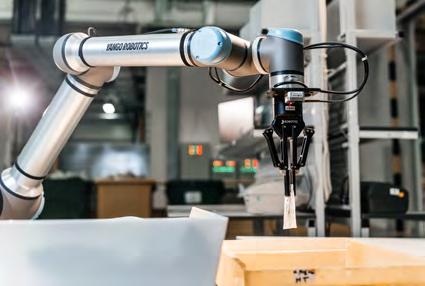

Nestled by the coast of Lusail sits the splendor of Raf es and Fairmont Doha, where luxury is rooted in even the smallest details. Open the doors to mesmerizing hospitality and make memories in a world of sophistication.

CONNECTING TRADE PROFESSIONALS WITH INDUSTRY INTELLIGENCE
CEO
Wissam Younane wissam@bncpublishing.net
Managing Director
CEO
Rabih Najm rabih@bncpublishing.net
Wissam Younane wissam@bncpublishing.net
Group Publishing Director
SUBSCRIBE subscriptions@bncpublishing.net
SUBSCRIBE subscriptions@bncpublishing.net
Joaquim D’Costa jo@bncpublishing.net
Director Rabih Najm rabih@bncpublishing.net
Commercial Director
Group Publishing Director
Andrea Mocay andrea@bncpublishing.net
Joaquim D'Costa jo@bncpublishing.net
Editor-in-Chief
Editor-in-Chief
Vibha Mehta vibha@bncpublishing.net
Vibha Mehta vibha@bncpublishing.net
PO Box 502511 Dubai, United Arab Emirates P +971 4 4200 506 | F +971 4 4200 196
Editor Aya Zhang aya@bncpublishing.net
Managing Editor Kasun Illankoon kasun@bncpublishing.net
Digital Reporter
Design
Reeba Asghar reeba@bncpublishing.net
Christian Harb
Creative Lead Christian Harb chriss@bncpublishing.net
Marketing Executive
Aaron Joshua Sinanbam aj@bncpublishing.net
Editorial Design
Digital Media Producer
Rizaldi Febrian
Alexander Bungas
Marketing Executive
Aaron Joshua Sinanbam aj@bncpublishing.net
Videographer
Eduardo Buenagua

For all commercial enquiries, contact jo@bncpublishing.net T +971 50 440 2706
PO Box 502511 Dubai, United Arab Emirates P +971 4 4200 506 | F +971 4 4200 196
For all commercial enquiries, contact jo@bncpublishing.net T +971 50 440 2706
All rights reserved © 2025. Opinions expressed are solely those of the contributors. Logistics News ME and all subsidiary publications in the MENA region are officially licensed exclusively to BNC Publishing in the MENA region by Logistics News ME.
No part of this magazine may be reproduced or transmitted in any form or by any means without written permission of the publisher.
Printed by United Printing and Publishing | upp.ae
All rights reserved © 2023. Opinions expressed are solely those of the contributors. Logistics News ME and all subsidiary publications in the MENA region are o cially licensed exclusively to BNC Publishing in the MENA region by Logistics News ME. No part of this magazine may be reproduced or transmitted in any form or by any means without written permission of the publisher. Printed by United Printing and Publishing | upp.ae
Images used in Logistics News ME are credited when necessary. Attributed use of copyrighted images with permission. All images not credited courtesy Shutterstock.
In addition to our print edition, we’re bringing you all sorts of industry news on our web mediums. We’re looking forward to interacting with our readers on all of our social media and web platforms. See you on the web!
addition to our we’re bringing you all sorts of industry news on our web mediums. We’re looking forward to interacting with our readers on all of our social media and web platforms. See you on the web!
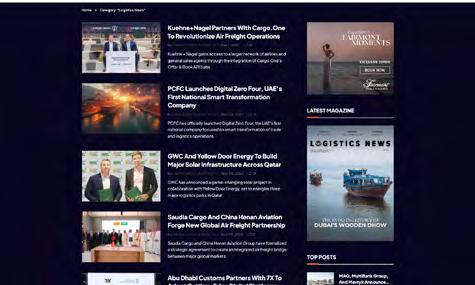


Sometimes, it feels deeply discouraging when nothing seems to be happeningwhen there are no signs, no momentum, and nothing
to show that you're getting closer to the next level. The temptation to stop can be extremely strong by then. But maybe, this is the most dangerous thing to do. Because this is often the
time that separates those who are truly done from those who are just one step away from a breakthrough.
We also know the fact that growth is not always loud. There is no specific template of how growth can look like. It can happen over a very long time, or it can happen overnight. It can be hidden in the small, unglamorous things, and it requires us to show up—especially when it’s hard and when motivation fades. Everyone says this, but it’s true: consistency really is the key.
As long as you are moving - no matter how slowly - you are not standing still. So regardless of how big the step is, it still builds momentum. And momentum over time creates change. One opportunity or breakthrough can shift the balance.
If it feels like nothing’s happening, don’t mistake that quiet for failure. What looks like stillness might actually be the groundwork being laid beneath the surface.
Aya Zhang Editor aya@bncpublishing.net
Xiaoyue (Aya) Zhang xiaoyuezhangg






























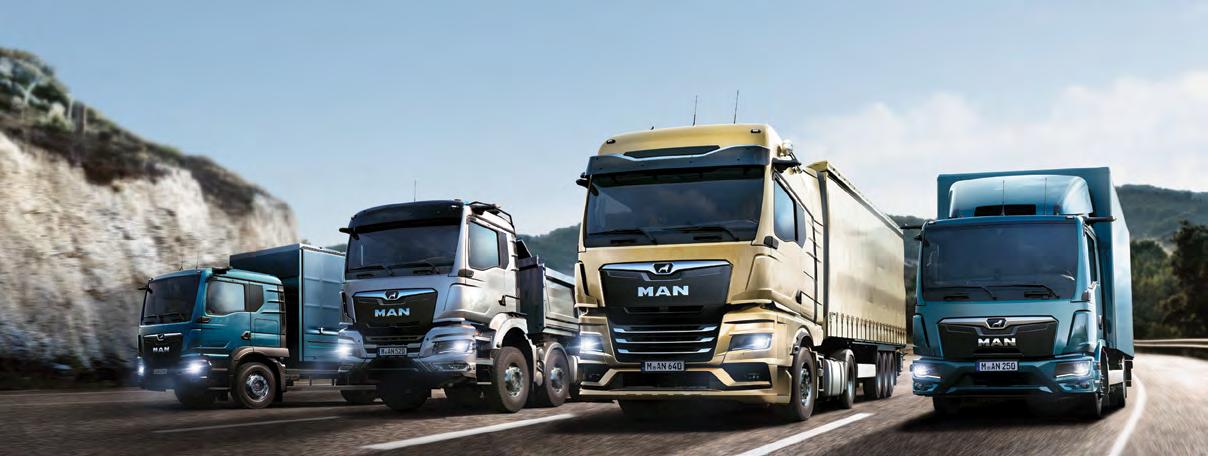












































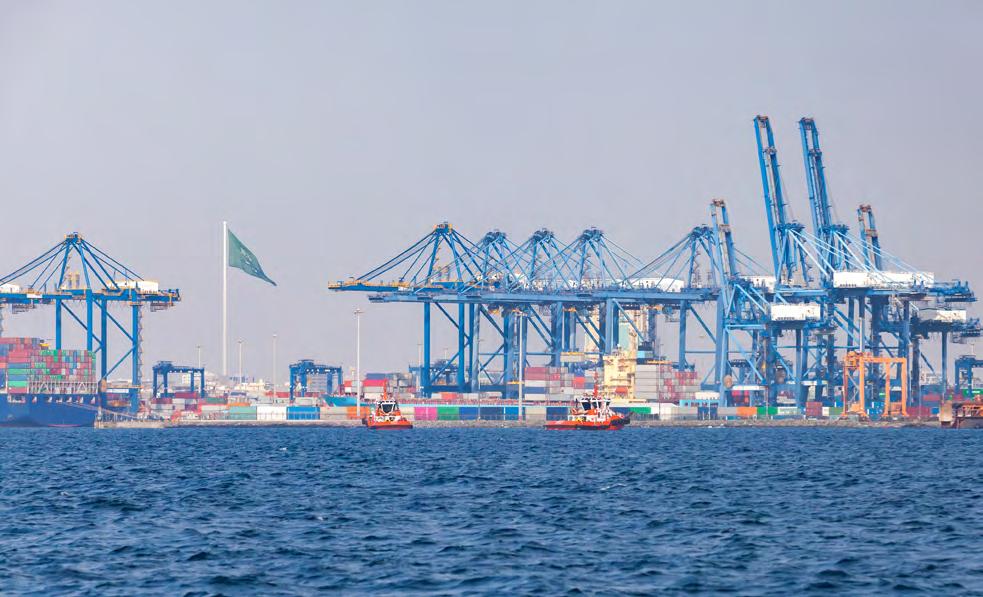
The Saudi Ports Authority (Mawani) has signed an agreement with Alissa Universal Motors, a subsidiary of Abdullatif Alissa Group Holding, to establish a logistics park at King Abdulaziz Port in Dammam. The project involves an investment of up to SAR 300 million and will cover an area of 382,000 square meters. The park will be dedicated to the import and reexport of vehicles and spare parts.
The agreement was signed by the Acting President of the Saudi Ports Authority, Mr. Mazen bin Ahmed AlTurki, and the Managing Director of
Abdullatif Alissa Group Holding, Mr. Abdullah Abdulmohsen Alissa.
The establishment of the logistics park is part of Mawani’s initiatives aligned with the objectives of the National Transport and Logistics Strategy. It aims to create highefficiency logistics parks within and beyond the ports, supporting national development and empowering the Kingdom’s economic and social ambitions under Saudi Vision 2030.
The logistics park will include a 7,000-square-meter warehouse for spare parts storage and a logistics area capable of accommodating
more than 13,000 vehicles and trucks. This initiative will enhance the competitive advantage and regional standing of King Abdulaziz Port as a logistics hub, provide specialised logistics services, increase private sector contributions to economic development, and promote economic diversification.
It is worth noting that King Abdulaziz Port in Dammam plays a pivotal role in connecting the Kingdom to global economies. The port is distinguished by its advanced infrastructure and integrated logistics facilities, making it an attractive destination for major international companies.
In a strategic move marking a major shift in innovation and smart technology, the Ports, Customs and Free Zone Corporation (PCFC) officially announced the launch of “Digital Zero Four” — the first national company specialising in the smart transformation of commercial operations and the development of digital solutions that support global economic growth.
On this occasion, H.E. Sultan Ahmed bin Sulayem, Chairman of the Ports, Customs and Free Zone Corporation, emphasised that the establishment of the company and its launch from Dubai — widely recognised as the leading hub for innovation and smart technology solutions and the global capital of trade and economy — reaffirms the Corporation’s commitment to cementing Dubai’s status as a world centre for technology, smart systems, and logistics and trade operations. He noted that Digital 04 will serve as a digital gateway for the most advanced smart solutions in global business, trade, and logistics services, including ports and maritime transport.
Bin Sulayem stated, “Today, with the launch of Digital 04, we are proud to lead global technological innovation and export our pioneering services in the port sector — developed through innovative use of technology and digital services — to the world. Our aim is to make Dubai a model city for managing logistics services using the best technologies developed by our national talents specialising in technology and artificial intelligence.”
He added that the launch of Digital Zero Four is a result of the Corporation’s artificial intelligence strategy and aligns with the goals of the Dubai Economic Agenda D33, launched by His Highness Sheikh Mohammed bin Rashid Al Maktoum, Vice President, Prime Minister, and Ruler of Dubai. It embodies Dubai’s forward-looking vision by investing in human capital and advanced technology, leveraging the emirate’s world-class infrastructure, and strengthening its position as one of the most businessfriendly environments for both national and international investments.
H.E. Nasser Al Neyadi, CEO of the Ports, Customs and Free Zone Corporation, stated: “We
are proud to launch Digital Zero Four as a commercial front for our technological excellence in the logistics sector. Our national team has developed AI-powered solutions that are transforming multiple industries. Through this new arm, we aim to export innovation to global markets and further boost Dubai’s position as a global centre for smart technologies and digital transformation.”
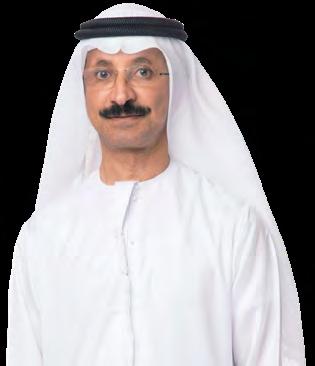
Al Neyadi explained that Digital Zero Four focuses on providing AI-backed services and solutions that enhance efficiency and institutional growth across key sectors, including commercial licensing, civil engineering, port security, maritime operations, and advanced customs solutions. The company will be managed by the PCFC’s Technology and Digital Transformation sector, ensuring a blend of institutional expertise and advanced digital innovation.
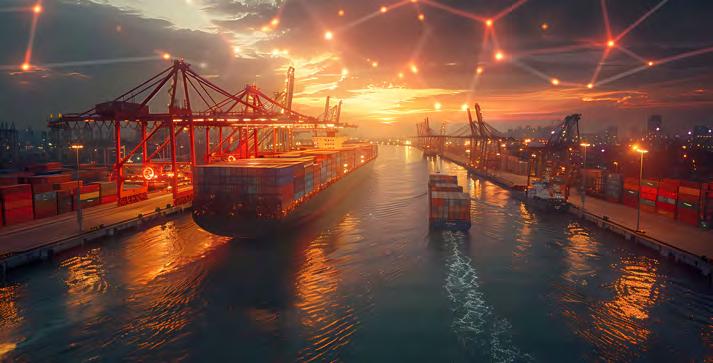
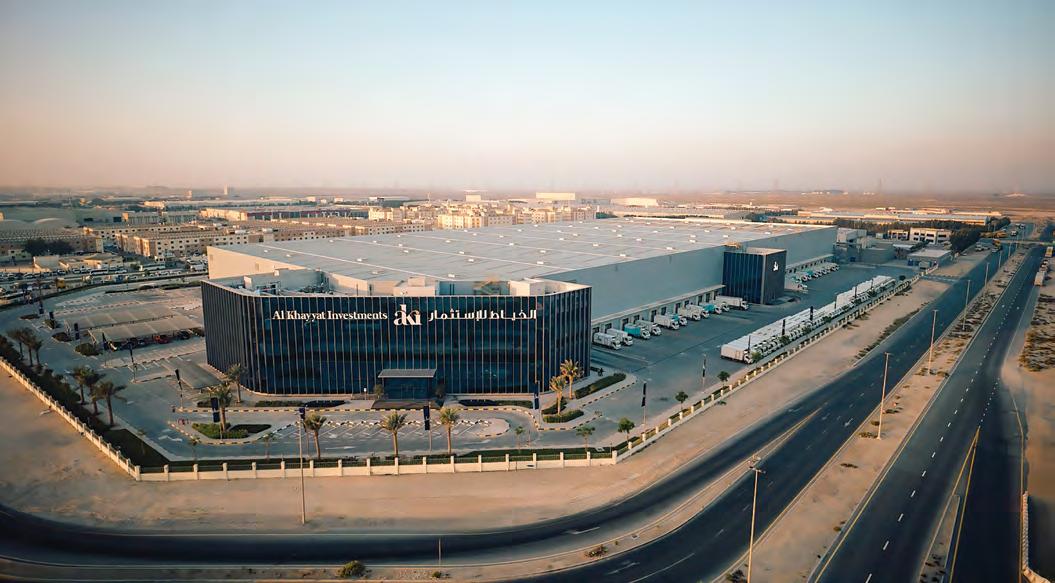
Al Khayyat Investments (AKI) has announced the opening of a stateof-the-art Fulfilment & Innovation Centre in Dubai Industrial City, part of TECOM Group PJSC, that will serve as a cornerstone for the company’s continued regional expansion as well as raising the benchmark in agile, sustainable supply chain operations in the UAE.
Spanning one million sq ft, the facility quadruples AKI’s fulfilment capacity in the UAE while enabling faster and more efficient delivery of goods to AKI’s extensive partner and customer network. Initially, the centre will focus on supporting AKI’s growing retail, e-commerce, and distribution businesses, serving more than 30,000 business customers as well as supporting home delivery services for consumers. The centre already has an on-time delivery rate of 98.5% for orders requested within 24 hours.
AKI achieves this through multiple storage solution systems, with a capacity of 78,000 pallets and 67,000 bins. The site already handles over half a million units per day, with the capability to triple this figure. It
includes provisions to expand by nearly 200,000 sq ft and adding 22,000 additional pallet positions in the near future. Operations are supported by a fleet of over 150 vehicles, with the warehouse processing an average of 65,000 orders per month. This includes approximately 17 million units shipped monthly, with an average of 23,000 unique B2B customer deliveries.
Zaid S. Al Khayyat, Managing Director of AKI, highlights that the opening builds on the goals set out in the Dubai Economic Agenda (D33) to capitalise on Dubai’s strategic location and advanced infrastructure to raise the city’s status as a preferred destination for major international companies and investments.
“This represents a pivotal moment for AKI as we innovate across a diverse portfolio of businesses and partnerships to bring more people the things that matter to them,” states Al Khayyat. “Yet this facility is not just about enhancing our own operations. It is a strategic investment that creates long-term value for our partners and customers, while contributing to the UAE’s future-focused economy. Above all, it represents the power of our
people driving our business forward every day.”
“Dubai Industrial City is proud to be the home of AKI’s new fulfilment centre,” says Saud Abu Alshawareb, Executive Vice President – Industrial at TECOM Group PJSC. “Our district’s proximity to Jebel Ali Port, Al Maktoum International Airport, and an Etihad Rail freight terminal enables connectivity for Al Khayyat Investments’ new fulfilment centre and sets it up for long-term success. Home to more than 1,100 manufacturing champions and 350 operational factories, Dubai Industrial City is committed to supporting such strategically significant projects, in line with Operation 300bn, Make it in the Emirates, and Dubai Economic Agenda ‘D33’.”
Samer Sabri, Group Chief Supply Chain Officer at AKI, adds: “This facility is a testament to the extraordinary teams within AKI who embrace diverse thinking to push boundaries, do more, and set the benchmark in supply chain excellence. The facility will truly redefine AKI’s position within the UAE market, ensuring swifter and more efficient distribution capabilities for our growing business ecosystem.”
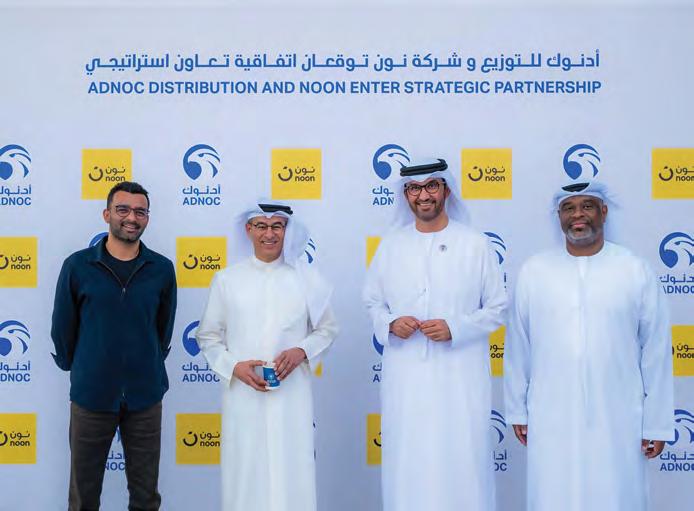
ADNOC Distribution, the UAE’s largest fuel and convenience retailer, announced that it is entering into a strategic partnership with Noon, the Middle East’s leading digital ecosystem, through a Memorandum of Understanding (MoU).
As part of this initiative, ADNOC Distribution and Noon will explore opportunities to enhance last-mile delivery through AI-powered logistics collaboration.
The collaboration was formalised at a ceremony held at ADNOC Distribution’s flagship Corniche service station in Abu Dhabi, in the presence of H.E. Dr. Sultan Ahmed Al Jaber, Managing Director and Group CEO of ADNOC and Chairman of ADNOC Distribution, and H.E. Mohamed Alabbar, Founder of Noon.
The partnership brings together ADNOC Distribution’s physical retail strength with Noon’s AI-enabled logistics platform, which allows Noon to optimise delivery operations through smarter inventory management, personalised recommendations and real-time route planning.
Eng. Bader Saeed Al Lamki, CEO of ADNOC Distribution, said: “This partnership marks a new chapter in ADNOC
Distribution’s transformation. By combining our nationwide retail network with Noon’s advanced digital and logistics capabilities, we are accelerating our journey to turn service stations into smart convenience hubs—powered by technology and focused on delivering real value to our customers and shareholders.”
Through this collaboration, new Noon Minutes distribution centers will be placed at ADNOC Distribution service stations, reducing delivery times and expanding the reach of lastmile fulfilment across the UAE. For the first time, ADNOC Oasis products ordered via the ADNOC Distribution app will be delivered by Noon riders, enhancing convenience and providing seamless digital-to-doorstep service to ADNOC customers.
This collaboration will also enable targeted recommendations through the ADNOC Rewards program, demonstrating ADNOC Distribution’s commitment to creating hyper-personalised experiences for its customers.
Faraz Khalid, CEO of Noon, said: “Our collaboration with ADNOC Distribution is a major step forward in how we redefine convenience for customers in the UAE. By integrating our digital platforms with ADNOC Distribution’s unmatched infrastructure, we will continue to deliver unmatched speed, selection and reliability to our customers across the UAE. With ADNOC Distribution as a key strategic partner, Noon is stronger and even better positioned to serve our customers.”
The event included a leadership walkthrough of key initiatives showcasing ADNOC Distribution’s evolution into a techenabled retail leader, including automated EV Plug + Charge, seamless Fill & Go fueling and Click & Collect in-app ordering for ADNOC Oasis products.
The collaboration underscores ADNOC Distribution’s broader strategy to expand non-fuel retail, grow digital channels, and enhance operational efficiency through the deployment of AI and digital projects across its business.

How are innovation, collaboration, and talent shaping the future of supply chains?
Today’s supply chains have to deal with multiple sources of disruption, like geopolitical factors and climate change, as well as economic volatility and new technologies. The most recent development which puts extra strain on supply chains is the increasing tariffs between China and the United States. This shift points towards adapting supply chains to be more flexible and resilient.
While trade variables can seem like a nuisance at first, they prompt a shift to increased innovation, diversification,
and trade cooperation. The trade war does not hinder businesses; instead, it forces them to revisit their global sourcing policies, explore new prospective markets, and create adaptable systems. A shift in approach comes with the promise of making supply chains smarter and more sustainable, but also more adaptable to future demands.
One specific approach that is widely regarded as innovative is supplier diversification. Becoming reliant on a certain region or vendor, as a one-stop shop, is no longer a feasible business model. Look at Apple, for instance. The company
is trying to move some of its operations from its traditional manufacturing hub in China to India and Vietnam. This strategy not only prevents the company from falling victim to geopolitical uncertainties but also aids in tapping new markets and labour forces. On a regional level, Middle Eastern countries are starting to source from multiple regions and increase in regional capabilities, as it offers protection against global shipping slowdowns.
Dubai-based logistics giant DP World invests heavily in Africa and South America, boosting trade with the region
while also diversifying away from traditional shipping routes.
The practices of nearshoring – moving production closer to the market – and friendshoring – sourcing goods from allied political nations – can alter international trade patterns. For instance, American manufacturers are increasingly moving to Mexico, while European companies are looking to partner with North African and Eastern European businesses. Such a change does not signify the cessation of globalisation but rather the start of a more advanced, decentralised, and cooperative model of international relations. This also improves ecological sustainability, reduces carbon emissions, and expedites delivery times.
The role of technology as an enabler of supply chain resilience is becoming more profound with every passing day. From ensuring real-time visibility to offering predictive insights, analytics tools help organisations prepare for disruptions and respond to them in record time. An interesting case is Maersk’s digital transformation journey. The leader in global shipping integrates AI and IoT all over its network to enhance cargo tracking, port operations, and demand forecasting.
In the Middle East, Emirates SkyCargo launched digital platforms to allow real-time tracking of shipments for better transparency and timely delivery in sensitive industries such as pharmaceuticals and perishable goods. Blockchain is coming under focus as a dividing tool in traceable fields like food and medicine. For example, product verification and consumer confidence is being strengthened through better recall processes enabled by global companies such as Walmart and Nestle adopting blockchain technology.
Resilient and sustainable supply chains have become two sides of the same coin. A working definition for a sustainability-centered supply chain focuses on environmental, social, and governance (ESG) goals alongside economic efficiency. While business ethics
aims at social responsibility, the logistics of the business are aligned with ESG goals. This improves stakeholder trust, brand perception, and value while improving supply security. In the UAE, organisations are adjusting to foster economic growth by aligning with national priorities. This includes supporting initiatives like Net Zero by 2050 or caring for environmental infrastructure defined by clean transportation, boosting civil infrastructure, and green construction..
No one can operate supply chains independently in this interconnected world. Only the supply chain networks that connect with others via collaborations with their suppliers, partners, competitors, regulators, and even across other sectors stand resilient. Strategic partnerships between government and other regions, as well as cross-sector alliances, have addressed multifaceted problems effectively. These partnerships have managed health crises alongside maritime disruptions, demonstrating the importance of unified efforts toward shared objectives.
Though technology and systems play a vital role, people remain at the core of resilient supply chains. The long-term success of any venture still relies on proficient professionals capable of manoeuvring new tools, changing trade policies, and operational risks. An increasing focus is being awarded by academic and corporate training institutions to develop ready-to-deploy talents for the future. Graduates in the Heriot-Watt University Dubai are offered specialised programs in supply chain management and sustainable finance which arms them with the strategic and technical skills needed to command in the global trade industry.
The persisting global issues notwithstanding, the future of supply chains remain bright. It is no longer sufficient to simply react to disruptions; the focus should also include constructing fortifications that ensure an undeniable focus on people and partnerships. While the environment of trade will continuously change, so will the capabilities to meet them. With the right approach towards business, there is bound to be both survival and growth in the market.

What if the true challenge of scaling a business isn’t how fast you grow, but how deeply you stay rooted in your values?
Scaling a business today is often framed as a race — a rush to capture market share, a sprint to the next funding milestone, a relentless pursuit of size. But scale, in and of itself, is fleeting. True scale must be rooted in purpose. It must be earned, not engineered.
As CEO of Kibsons, now home to over 1,000 team members, serving thousands of customers daily, I have witnessed firsthand that the real challenge
is not growing — it is growing while maintaining your core values.
From our earliest days, we have resisted the gravitational pull toward growth for growth’s sake. Instead, we have chosen the harder path: building an organisation where operational excellence is matched by emotional intelligence and a connection with our people. In a nutshell, we have scaled our systems and capabilities in order to stay true to our values and our customers’ trust. In online retail, a sector
where technology enables infinite consumer options to ever-evolving daily needs, customer experience becomes your true product. It is the invisible thread that holds everything together. No amount of efficiency can compensate for a business that forgets humanity at its core.
Every interaction, from browsing to delivery, must affirm that we see the customer not as a data point, but as a person who is trusting us with something essential: their family’s nutrition, healthy
choices, household essentials and ultimately wellbeing. We do not outsource this responsibility. We own it — every day, in every department.
As we scaled, preserving this closeness and affinity with customers became harder and therefore even more essential. Talking about customer-centricity is easy; operationalising it at scale is another matter. It meant designing systems that could flex with individual needs, not force uniformity. It meant empowering front-line teams to solve problems with empathy, not enforcing rigid or unresponsive procedures. Most of all, it meant creating an internal culture where customer experience was not a department, but a shared ethic.
Culture is the most critical and also the most fragile asset, especially through change. When a company is small, culture is often informal, almost instinctive. But as layers of corporate structures are built and new people join, culture must be intentionally nurtured, otherwise it simply disintegrates.
At Kibsons, we have worked to build a culture of ownership, where every individual, from warehouse floor to leadership, feels responsible not just for their task, but for the mission. This ownership is not a policy you can mandate; it grows when people are trusted, heard, and empowered. It requires leadership that listens as much as it speaks.
It requires building systems that reward not just performance, but integrity — systems that are agnostic to seniority, because true ownership is cultivated across all tiers, from entrylevel employees and frontline delivery teams to the highest-ranking executives, all contributing to a culture of collective responsibility.
Growth exposes every weakness in an organisation’s cultural fabric. It tests whether your values are real, or merely decorative. In moments of pressure, your true organisational DNA reveals itself. That is why, during our expansion, we have invested relentlessly in training, mentoring, and internal dialogue. Culture is not static; it must evolve with scale, or it fractures under its weight.
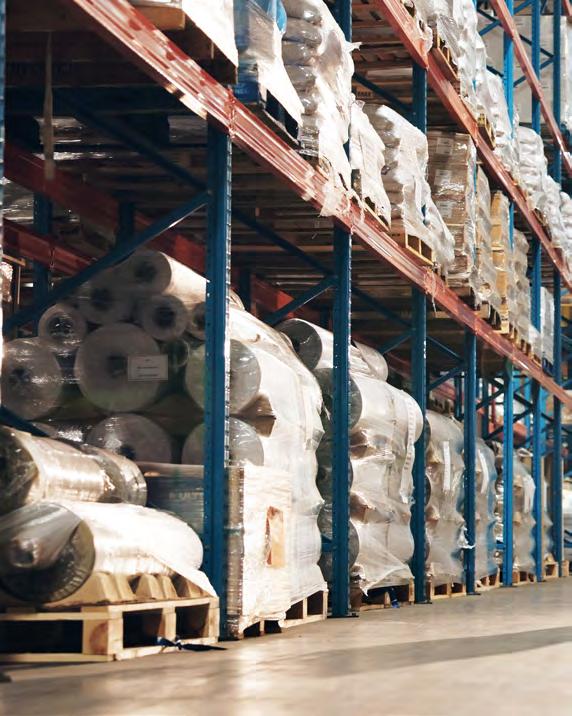
kind. In a market where consumer expectations evolve faster than business models, innovation is a survival mechanism.
Innovation has been another imperative. Not the glossy, headline-grabbing kind, but the quiet, disciplined and purposeful
At Kibsons, innovation has often meant asking not “What can we sell next?” but “How can we serve better?” It has meant reimagining our logistics to ensure faster, fresher deliveries. It has meant embracing technology to personalise customer journeys without losing authenticity. It has meant listening carefully to the

signals, the smallest complaints and emerging trends that point the way forward and responding creatively and with vision and intention. Innovation is the willingness to adapt, to improve, and to never assume that what worked yesterday will work tomorrow.
Underlying all of this is a belief that business must be an instrument of positive impact, not just a generator of profits. Sustainability, for us, is not a side project; it is integral to how we think about our future viability.
The pressures of scaling often push companies toward easier, cheaper paths packaging that pollutes, sourcing that exploits, processes that waste. We have
tried to choose differently, even when it meant higher costs or slower paths. Our investments in eco-friendly materials, in ethical sourcing, and in reducing our carbon footprint are not only mere marketing strategies. They are decisions about what kind of legacy we want Kibsons to leave. In an industry built on movement of goods, of money, of resources, we have a duty to ask: What are we moving toward?
Scaling Kibsons has been a profound leadership journey — not just an exercise in managing operations or chasing KPIs, but an ongoing question: How do you grow without losing your essence?
It is a question every business leader grapples with in this era of speed and scale. And the answer, I believe, lies in staying relentlessly anchored to purpose, to people, to principles.
Leading a company at scale is humbling. Every success feels provisional; every milestone is a reminder of the responsibility we carry. It is easy to grow big. It is much harder and much more worthwhile to grow sustainably, with purpose and integrity, while staying true to the values that define us.
Today, after nearly a decade in e-commerce, Kibsons is committed to choosing the harder path. We believe true leadership is defined not by how far you climb, but by what you build and who you bring along with you.

Alan Win, Founder and CEO of Middlebank Consulting Group, shares over 25 years of supply chain expertise, regional insights, and strategic innovation
Alan Win brings over 45 years of hands-on experience in logistics, supply chain, and value chain management across more than a dozen countries, including pivotal markets such as Australia, the UAE, and throughout Asia. His background blends industry leadership and academic excellence, allowing him to serve as a “pracademic” who bridges real-world execution with strategic thinking. Importantly however, Middlebank Consulting Group (MCG) is more than just him, it comprises a team of highly experienced professionals.
MCG is a specialist supply chain and logistics advisory firm, established to provide independent, experiencebased consulting. The company works at the intersection of strategy, execution, and education – helping

clients navigate complexity, enhance performance, and create resilient, future-ready supply chains.
Over the past 25+ years, MCG has had the privilege of working with some 200+ client organisations across the globe. The company takes pride in the fact that the vast majority of those clients are strong advocates of the value MCG has created within their operations.
MCG has announced an expanded strategic partnership with Netstock, a global leader in inventory management and demand planning software, in April, 2025.
This collaboration combines MCG’s deep consulting/advisory
expertise with Netstock’s advanced inventory, demand and supply planning software, delivering substantial benefits to regional supply chains. It also underscores MCG’s commitment to delivering innovative solutions that address the evolving challenges of supply chain management.
For businesses in the Asia-Pacific and Middle East, this partnership offers a pathway to modernise supply chain operations. By leveraging Netstock’s technology and MCG’s consulting acumen, companies can achieve greater efficiency, agility, and competitiveness in their supply chains.
Optimising supply chains in the Middle East – particularly the Gulf
region – requires acute sensitivity to regional nuances that often diverge significantly from Western or Asian markets. Some of those nuances include:
In the Middle East, proximity to conflict zones and key maritime chokepoints creates unique challenges for supply chains. This necessitates an emphasis on multi-routing, inventory buffers, and comprehensive scenario planning to mitigate potential disruptions. Trade compliance and diplomatic sensitivities must also be factored into sourcing decisions to ensure smooth operations. To address these complexities, MCG offers risk-adjusted supply network modeling, helping clients build resilient and adaptable supply chains.
The region’s heavy investment in logistics infrastructure, such as Jebel Ali, Khalifa Port, and NEOM, along with the proliferation of free zones offering tax and customs incentives, presents significant opportunities. By strategically locating distribution centers near ports, airports, and free trade zones, companies can drastically reduce costs and enhance agility. However, this requires optimising customs processes and utilising bonded warehousing. To capitalise on these advantages, MCG
develops “Port-Centric Strategy Playbooks” and Free Zone Advantage Assessments to guide clients in maximising their logistics efficiency.
The Middle East’s reliance on predominantly expatriate labor, often transient and subject to strict visa and employment regulations, creates unique challenges for supply chains. This makes training, retention, and cultural integration crucial for success. The availability and cost of low-wage labor, along with nationalisation policies, also influence the adoption of automation. To address these issues, MCG integrates labor risk audits, HR-logistics alignment, and automation feasibility studies into supply chain strategies, ensuring clients can navigate these complexities effectively.

digital innovation and sustainable practices will be key differentiators, positioning companies for long-term success in a competitive landscape.
There is significant variation in digital maturity across different areas, meaning that tech enablement strategies must be tailored to each country’s readiness and regulatory framework. The demand for real-time visibility and blockchainbased traceability is growing, particularly in ports and logistics. To assist clients in navigating this landscape, MCG offers Digital Capability Assessments and regional tech ecosystem mapping, ensuring solutions are aligned with local needs and capabilities.
For executives, it’s essential to recognise that a one-size-fits-all approach won’t work—regional adaptation is vital. Strategic use of infrastructure, policy incentives, and workforce flexibility can deliver significant value. Additionally, embracing
Supply chain consulting is rapidly evolving as global disruptions, digital innovation, and sustainability imperatives continue to reshape the operating environment. Looking ahead, several emerging trends are set to define priorities over the next five years. These include the growing adoption of AI, machine learning, and predictive analytics to enable proactive, data-driven decisions; a shift from cost-centric to risk-informed supply chains that account for geopolitical, environmental, and cyber threats; and increasing pressure for measurable carbon reductions, ESG compliance, and circularity. Other key developments include the rise of collaborative platforms and control tower operations, a widening talent gap in digital supply chain skills, the strategic reconfiguration of supply networks through nearshoring and localisation, and heightened demand for ethical procurement, transparent sourcing, and traceability—particularly in sensitive sectors such as food, pharmaceuticals, and fashion.


Require formwork and scaffolding? Check out Doka’s extensive list of products and systems, which now includes scaffolding for a variety of applications. At Doka, our philosophy is to provide a broad range of services under one umbrella based on a growing demand for single-source solutions that adhere to the highest standards.
/DokaMEA /company/doka-middle-east-africa /doka_mea
meaapmarketing@doka.com | www.doka-me.com


The Logistics & Transport Awards
KSA 2025 lit up Riyadh on 14 April, transforming VOCO Hotel into a stage for Saudi Arabia’s logistics revolution.
Hosted by Logistics News Middle East and BNC Publishing, the evening celebrated the boldest thinkers, trailblazers, and innovators redefining how the Kingdom moves. From groundbreaking technologies to visionary leadership, the awards spotlighted those setting new standards in the region.
Saudi Arabia’s logistics sector is shifting gears fast — from a regional player to a global powerhouse. Supercharged by Vision 2030, the Kingdom is pouring investment into ports, rail, roads, and smart technologies, turning ambition into infrastructure. With its strategic location and appetite for innovation, Saudi Arabia is positioning itself as the beating heart of global trade routes.

It’s remarkable how quickly our event has cemented itself as a cornerstone of Saudi Arabia’s logistics scene. The industry’s trust and energy are what power us forward. With every edition, we double down on our mission: to spotlight the innovators, the rising stars, the game-changing technologies, and the bold infrastructure shaping the Kingdom’s logistics and transport future.
A huge congratulations to the winners whose drive and ingenuity are not just moving goods, but moving boundaries. Your impact is felt in every smarter route, every faster delivery, and every link strengthened in the Kingdom’s supply chain.
This is the moment when logistics in Saudi Arabia isn’t just evolving — it’s being redefined. This year’s winners are the trailblazers, the innovators, and the leaders who are driving the Kingdom’s supply chain into the future. The journey has only just begun!


The company reported the highest profitability in its history, exceeding SAR 311.7 Million after the successful acquisition of AutoWorld in July 2024. The acquisition of shares in Overseas Development Company (GES) in the logistics sector has strengthened the firm’s portfolio through operations in Saudi Arabia and the UAE.
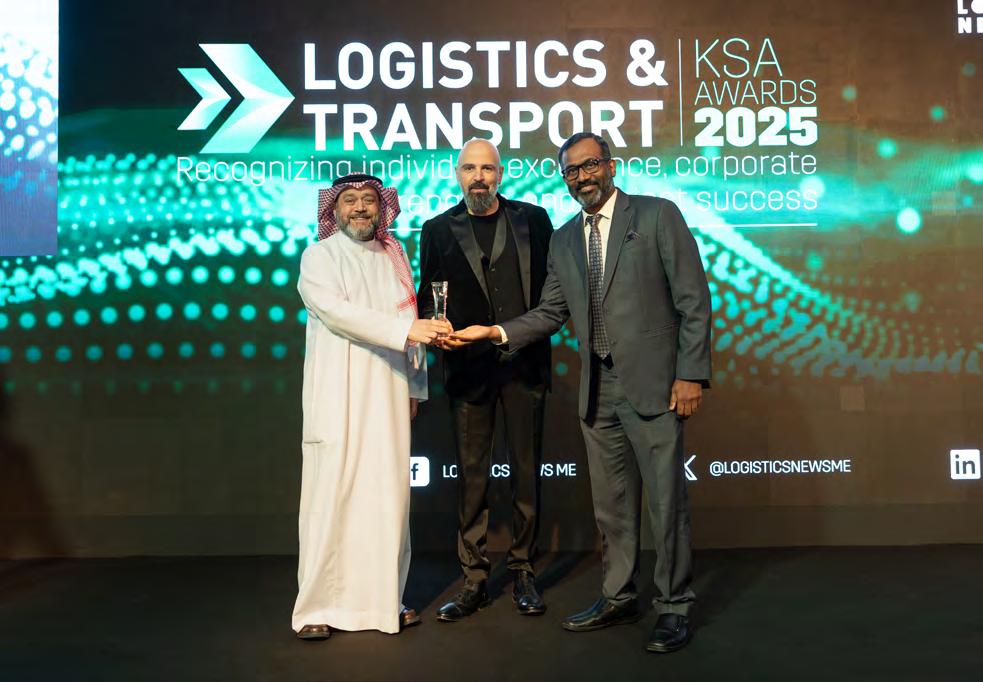

Located in the Red Sea port of Jeddah, LogiPoint has always enjoyed the distinction of strategic location on the world shipping routes. This strategic location has assumed an all too important role in the past couple of years or so as international conflict has brought strife and deadly attacks to the shipping routes.




The AutoStore Multi-Temperature Solution powered and implemented by Swisslog enables the simultaneous storage of fresh, frozen, and dry goods in one automated storage and retrieval system. This eliminates the need for separate cold storage facilities, reducing complexity and operational costs. The system combines typical AutoStore benefits like density, reliability and efficiency with the possibility of storing different temperature-related goods in one location.
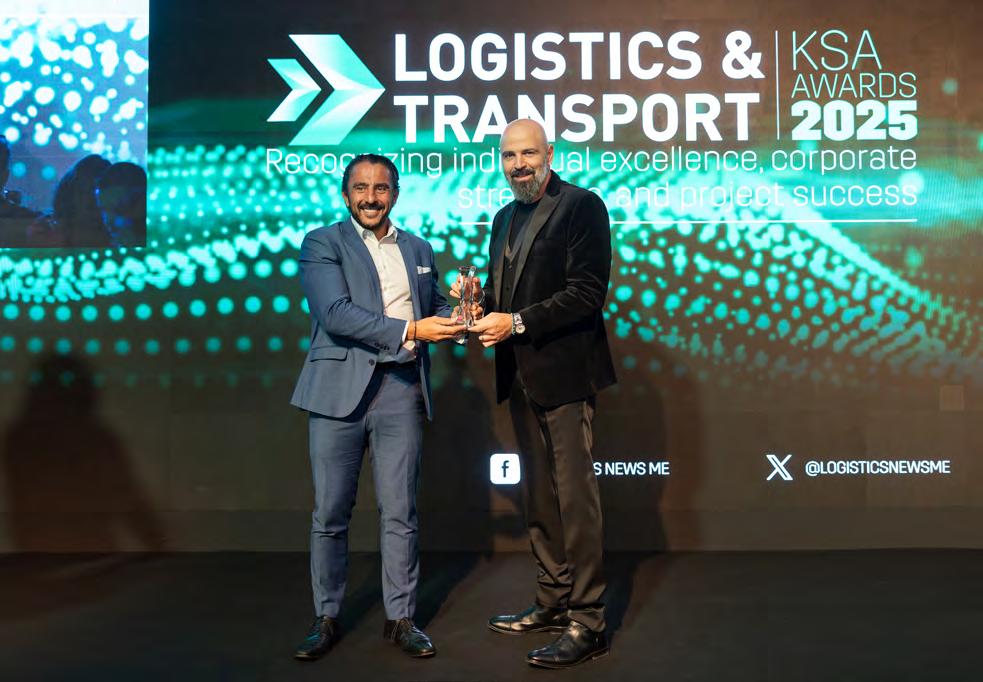


The company designed and automated the first Smart Logistics Distribution Center in the Pharmaceutical Industry across the MENA region. The state-of-the-art facility features temperature-controlled logistics and automated order fulfillment using cutting-edge technology to support Al Dawaa to guarantee medical security in accordance with the latest international standards.
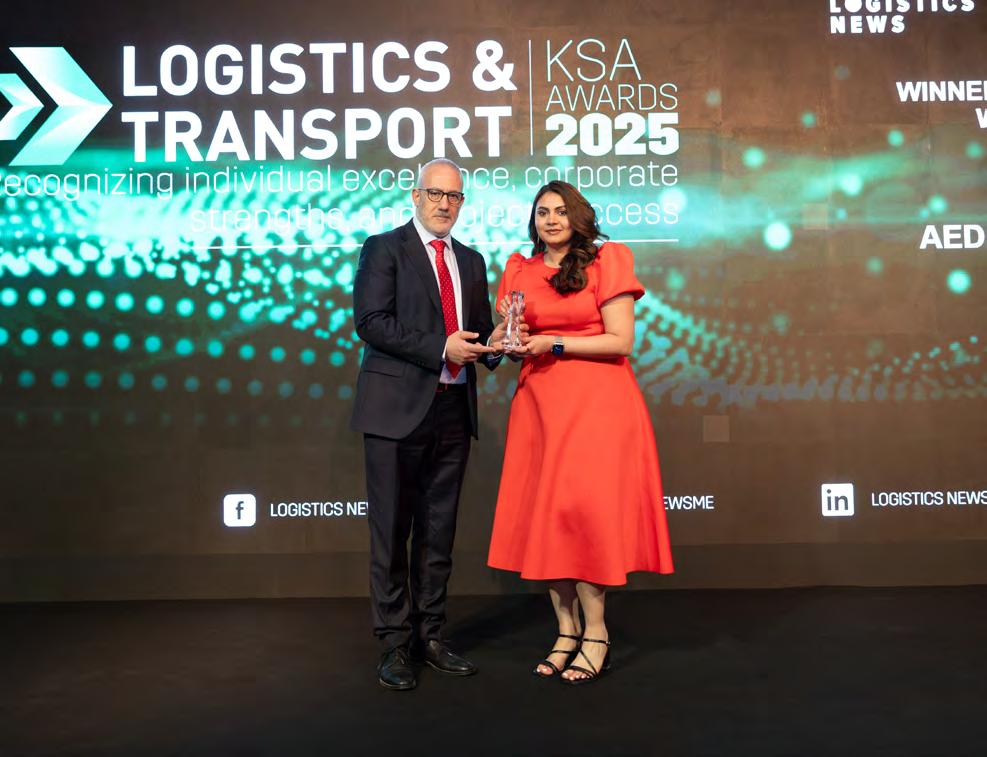


SAL Saudi Logistics Services, SAL Automated Data platform

SAL has launched a platform to create a connected logistics ecosystem nationwide. This platform connects logistics stakeholders through APIs, RPAs, and real-time data dashboards, enhancing operational processes from acceptance to customs clearance to delivery. It facilitates seamless data sharing among logistics ecosystem parties, including governments, airlines, logistics providers, and the company’s operations.

AJEX has emerged as a market leader, setting new standards for speed, reliability, and innovation in the last-mile sector. Headquartered in Riyadh, the company has expanded rapidly, achieving a revenue CAGR of 260% between 2022 and 2024.




LogiPoint stands as Saudi Arabia’s premier logistics real estate developer, demonstrating exceptional leadership in transforming the Kingdom’s logistics landscape throughout 2024. It secured a landmark SAR 1 billion+ investment deal with Gulf Islamic Investments (GII) Group for developing Grade A warehousing solutions across Saudi Arabia over the next 3 years.
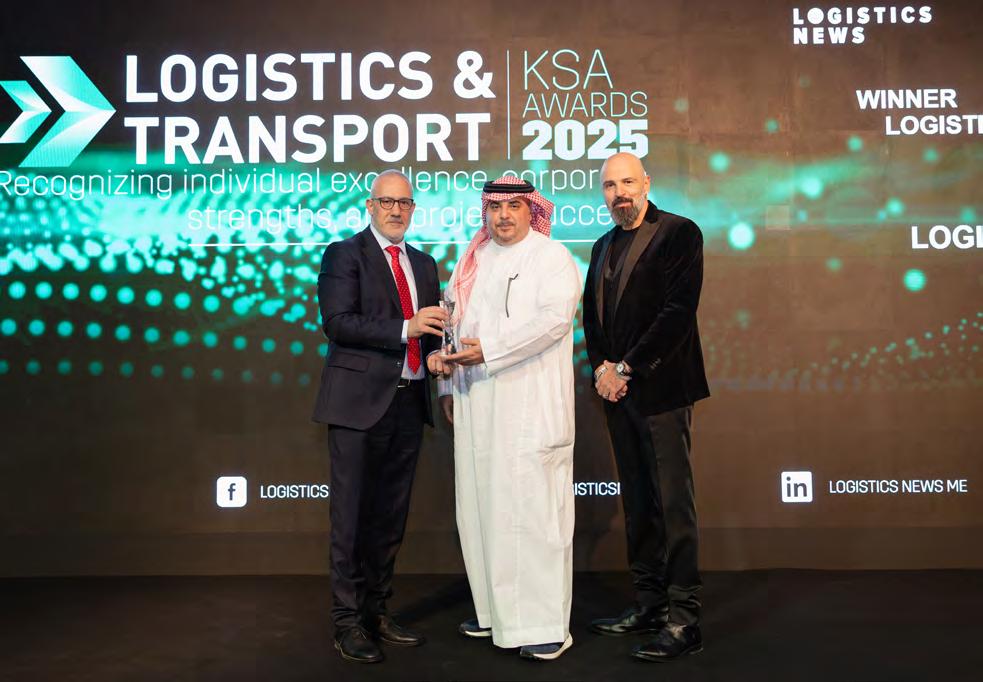


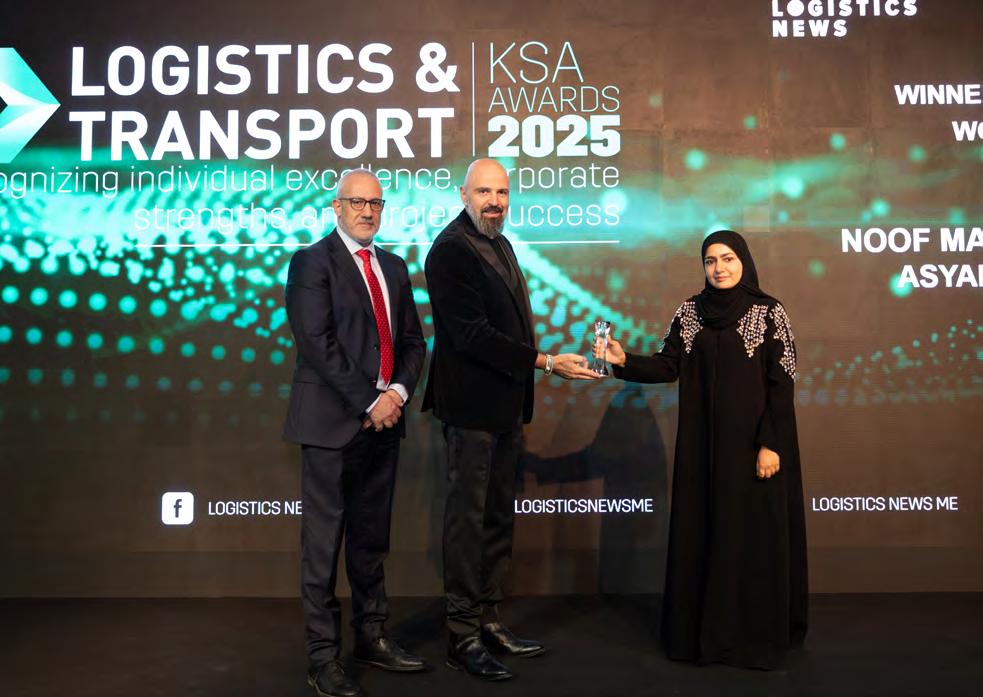
Noof Al Ajmi is recognised as an expert in developing strategies to secure procurement contracts and streamline day-to-day operations. With over nine years of experience in procuring ship spare parts, she has consistently leveraged market intelligence to identify alternative suppliers and implement cost-effective sourcing solutions. Her expertise spans the full tendering process—from pre-qualification to contract close-out—ensuring efficiency, compliance, and value throughout.

Fawaz Danish has played a key role in the company’s remarkable transformation into a leading Total Transportation and Logistics provider in the Kingdom. Under his visionary leadership, the company achieved a major milestone with its successful IPO on the Saudi Stock Exchange
in 2007. Drawing on his early experience in the family’s travel business—particularly supporting Hajj pilgrimage operations— Danish brought valuable insights and dedication that have fueled nearly two decades of sustained growth and success at the company.
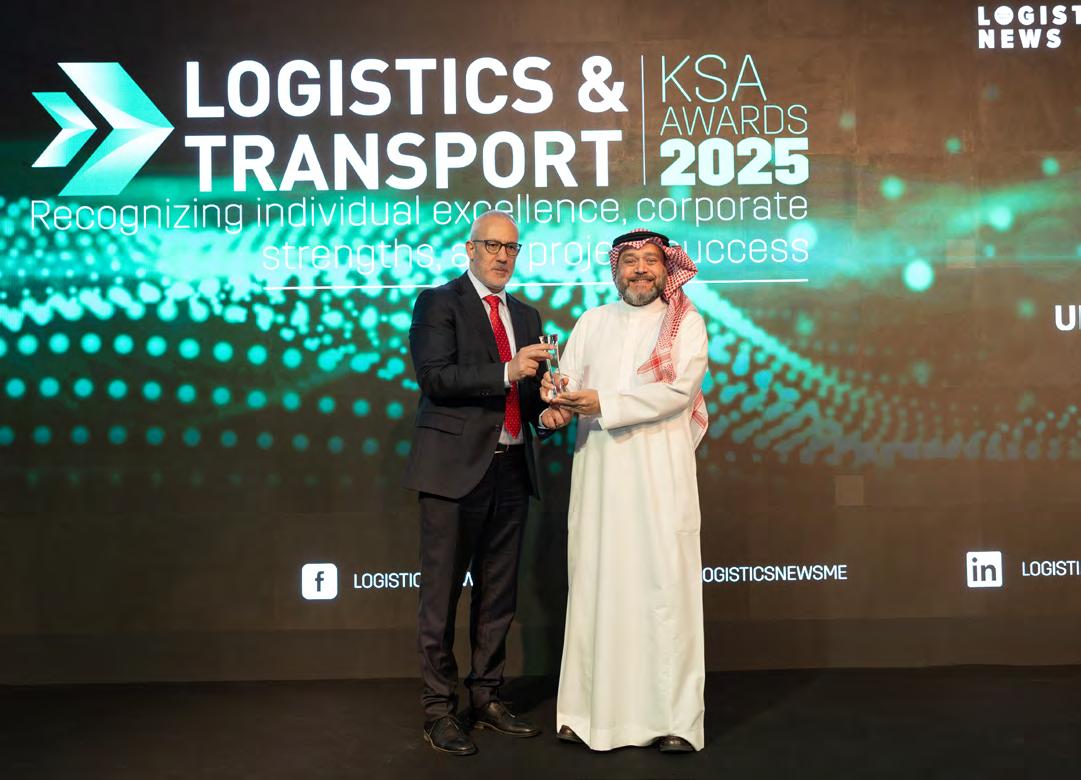







Bassel El Koussa, Co-Founder and CEO of Quiqup, outlines the company’s strategic expansion into Saudi Arabia and its commitment to offering integrated logistics solutions for SMEs throughout the GCC
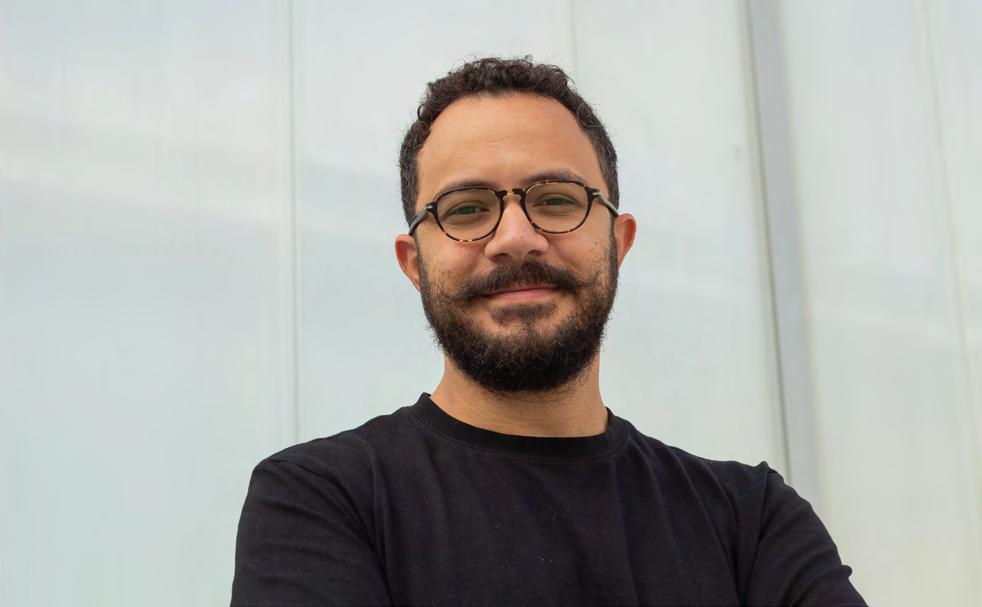
Bassel El Koussa, Co-Founder and CEO of Quiqup
Quiqup, an e-commerce logistics provider based in the UAE, has successfully introduced its core fulfillment and delivery services in Saudi Arabia, marking a significant step in its regional growth. This expansion is supported by the Mohammed bin Rashid Innovation Fund (MBRIF), which has been crucial in helping Quiqup grow its operations and double its business over the past two years.
The move follows the company’s notable success in the UAE’s e-commerce sector and aligns with its broader strategy of offering integrated logistics solutions across the
GCC. Established in 2017, Quiqup specialises in providing a range of logistics services for small and medium-sized enterprises (SMEs), including storage, sorting, packaging, and delivery.
Quiqup Expands into Saudi Arabia
Expanding into Saudi Arabia aligns perfectly with Quiqup’s core mission: enabling independent, direct-to-consumer e-commerce businesses—especially SMEs—to grow seamlessly into regional and international players. Quiqup’s strategic goal is to democratise access to advanced logistics
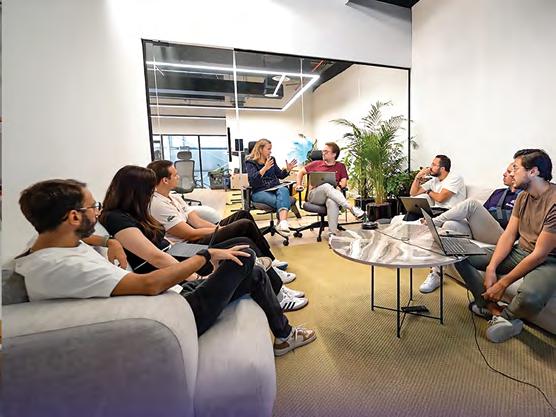
capabilities, traditionally reserved for larger enterprises with dedicated logistics teams, and make these accessible to ambitious, growing businesses. The company firmly believes that the next wave of e-commerce innovation and ecosystem development will be led by these agile, homegrown brands and regional ventures.
By entering the Saudi market, Quiqup aims to facilitate cross-border expansion in both directions—helping UAE businesses establish and scale their presence in Saudi Arabia, while simultaneously empowering Saudi-based businesses to tap into opportunities within the UAE. These two markets complement each other exceptionally well, making the entry into Saudi Arabia a strategic and logical next step. Ultimately, this expansion underscores Quiqup’s vision of creating a simplified, supportive environment for businesses to flourish without being constrained by logistical complexities.
The Mohammed bin Rashid Innovation Fund (MBRIF) has been instrumental to Quiqup’s journey, particularly during the challenging period right in the middle of COVID-19. At a time when market uncertainty was high and investors were cautious about deploying capital, MBRIF stepped in to provide crucial funding. This support represented a strong vote of confidence in the company’s innovative approach and services, significantly enhancing its positioning in the UAE market.
Additionally, the funding enabled Quiqup to invest directly in innovation by supporting tech development and related salaries, and provided essential financing during a critical phase as the business fine-tuned its value proposition and
sought product-market fit. Ultimately, the backing from MBRIF has been pivotal in helping Quiqup reach the stage it is at today.
The Secret Sauce Behind Quiqup’s Rapid Rise
Quiqup’s rapid growth can be attributed to several core drivers, foremost among them being its unwavering commitment to client-centricity. This focus permeates every aspect of the organisation—from operations and technology development to team culture. By placing the customer at the heart of everything it does, Quiqup has consistently been able to anticipate and respond effectively to evolving needs, creating tailored solutions that resonate deeply with clients. This intense customer orientation has resulted in strong word-of-mouth and virality, establishing Quiqup as the go-to client-centric logistics provider in the market.
Additionally, behind its external success is an exceptional internal team. Quiqup has cultivated a culture that empowers talented individuals to achieve personal excellence and professional growth, fostering a workplace where team members feel they can realise their maximum potential. This dynamic, driven, and committed team has been fundamental to executing the company’s vision and achieving sustained growth.
Lastly, the support from shareholders and stakeholders has been instrumental. Key clients who placed their trust in the company early on allowed it to innovate boldly, while shareholders provided vital support during critical growth phases, standing by the company through various challenges. This supportive ecosystem has significantly contributed to Quiqup’s trajectory, enabling it to consistently move forward and scale successfully.
The logistics and e-commerce landscape is evolving rapidly, characterised by a growing emphasis on enhancing the customer experience throughout the post-checkout journey, particularly in fulfillment and delivery. Today’s consumers are increasingly attracted to brands with strong value propositions, yet simultaneously there is significant growth in low-cost retail options. These dual trends highlight diverse and evolving consumer preferences. Additionally, there is a noticeable shift among e-commerce businesses towards expanding internationally rather than limiting their ambitions to domestic markets. Finally, there is an increasing interest from all e-commerce retailers to focus more and more on the post-checkout journey and experience to the end customer more than ever before.
Quiqup is proactively adapting to these changing expectations by maintaining a relentless focus on customercentricity. Its close interaction with clients allows it to quickly
capture insights and translate them into continuous improvements in its products and technological capabilities. The company structured itself to thrive on responsiveness, ensuring it remains agile and evolves swiftly to meet and exceed the dynamic demands of its clients and their customers.
Smart Tech Driving Faster, Smoother, Smarter Logistics Technology is foundational to Quiqup’s identity and operations— at its core, it is a tech-driven company dedicated to solving complex challenges in the e-commerce logistics space. Its origins as an on-demand consumer marketplace underscore its agility and commitment to continuous evolution, always adapting its technological solutions to address the most pressing market needs effectively.
Quiqup’s advanced platform integrates artificial intelligence, agentic workflows, and sophisticated automation to streamline operations, ensuring its processes remain efficient, lean, and highly responsive. By embedding these technologies deeply into its operational framework, the company maintains the agility required to swiftly adapt and seize emerging opportunities. This technological robustness enables Quiqup not only to enhance operational efficiency but also to significantly elevate the customer experience.
Looking ahead, Quiqup is excited about the future. The company has exciting developments underway in its product and technology that it believes will significantly impact the market very soon. With innovative initiatives on the horizon, Quiqup is eager to unveil them as it continues to drive forward its vision.





From warehouse automation to last-mile delivery, Yango Tech is building a smarter, cleaner supply chain. Two of its senior leaders—Alexei Filippov, Head of Global Business Development, and Nikita Gavrilov, Regional Head of Autonomy in the Middle East—share how AI and robotics are reshaping logistics at every stage.

Alexei Filippov on AI, Warehouses, and the Rise of Humanoids
As Head of Global Business Development at Yango Tech Robotics, Alexei Filippov is focused on transforming the back-end of e-commerce—from smarter warehouses to AI-powered sorting and picking. In this interview, he shares how AI is already streamlining operations and what the next wave of innovation might look like.
How is AI being used to improve e-commerce logistics and customer experience?
There are many layers to this. At Yang Tech, we’re focusing on AI powered by computer vision. What makes our approach unique is the use of imitation learning— our robots learn from human behaviour, emulating how a person would pick an item. The future we envision involves fully automated warehouses where different types of robots—stationary, mobile, autonomous— communicate and coordinate through AI.
Can you give a real example of how logistics businesses are using Yango Tech solutions today?
Yes, we’re currently piloting several projects with e-commerce businesses. These clients are looking to automate stages of their operations that involve highly repetitive tasks. Rather than having staff spend time on these, they’re reallocating human resources to more meaningful roles. The market here is very open to this type of innovation, and we’re seeing a huge uptick in interest across the logistics sector.
What are the core technologies Yango Tech is introducing to modernise logistics operations?
We offer several AI-driven software solutions. One core area is software for stationary robots that handle order sortation and piece picking. We also have an autonomous inventory cycle robot that automates warehouse inventory tracking, saving employees time and improving accuracy. All of this is powered by AI and designed for seamless integration in real warehouse environments.
What’s next in AI for logistics in the region?
One area with huge potential is automated truck loading and unloading—particularly relevant given how many loose goods arrive in shipping containers from China. These tasks are labour-intensive and often unsafe due to extreme temperatures in the region. While we’re not working in this space yet, we’re closely following developments. Longer term, I see humanoid robots entering warehouses. Grasping is one of the most complex human motions, and we’re developing a foundation model to train robots for this. Once that’s cracked, movement is relatively simple. So in 5–10 years, we’ll see significant growth in this area.
How scalable is this future?
It’s hard to put an exact number on it, but consider how many people currently work in warehouses. Many of their tasks are repetitive and could eventually be handled by autonomous systems. The challenge isn’t just the hardware—it’s the dynamic nature of warehouses. AI must account for constant movement, changing layouts, and new obstacles, which makes software the critical piece.
What excites you most about the future of AI and robotics in the Middle East?
The openness to innovation. There are incredible initiatives in the region that support AI adoption. When we speak with clients, the focus isn’t on buzzwords—it’s on the tangible value AI can bring to their operations, whether that’s enhancing safety, efficiency, or environmental performance. That mindset is very encouraging.
Nikita Gavrilov is at the forefront of reshaping last-mile delivery in the Middle East. As Regional Head of Yango Tech Autonomy, he shares how smart, fully electric robots are making deliveries cleaner, faster, and more efficient—while navigating real-world streets.
How can autonomous robots make deliveries faster and greener?
Let’s start with the “greener” aspect. Our robots are fully electric, meaning they have no negative environmental impact. For large food tech companies, partnering with us is crucial to meeting their sustainability goals. As for speed, it depends on the environment. Our robots work outdoors and navigate through various landscapes. We evaluate the area’s accessibility and ensure the robot can travel on wide sidewalks, pedestrian crossings, and traffic lights to maintain speed. In less crowded spaces, we can push the speed up to 8-10 km/h, aiming to average a speed of around 7.5 km/h. Currently, the average delivery time for a 2-kilometer radius is between 21 to 25 minutes, which is quite competitive compared to traditional delivery methods in Dubai.
Are there additional benefits for logistics businesses using autonomous robots?
Absolutely. Our robots are fully autonomous, meaning they can solve most delivery issues without

requiring a remote operator. They navigate obstacles and even give way to pedestrians and vehicles. This reduces the need for human management and helps cut costs. For instance, our robots can work for up to 10 hours on one battery charge. After the battery is swapped (which takes just one minute), the robot can work another 10 hours. This means we can cover two shifts with one robot. Also, the robots can carry up to 20 kilograms, the compartment itself is 71 litres, which suits grocery stores and restaurants perfectly. For example, it can carry six large pizza boxes, and three 1.5-litre bottles of beverage, or three to four typical grocery store bags. This makes it ideal for last-mile delivery in residential areas.
Are there any concerns with this technology?
The main challenge is public curiosity. When people see our robots, especially kids, they stop and try to interact with them. This can delay the delivery process since our robots
have safety features that stop them if there’s an obstacle, like a person or an animal, in their path. While this doesn’t happen often, it can impact delivery time if the robot is stopped too long by curious onlookers.
How far are we from large-scale implementation of robot deliveries in the UAE?
I believe it’s just a matter of time. We are already seeing great support from the government, especially for projects like ours. The process will be gradual, with area-by-area launches. With government backing and the increasing accessibility of areas for robots, we’re excited to expand further. We’re currently mapping more areas for future robot deliveries, so stay tuned for new developments!
Can you walk me through the process of how these robots work in real-world settings?
Sure! From an order being placed, the customer selects robot delivery on the website. After the order is packed, the
robot is notified and begins its journey to the customer’s location. It travels autonomously, navigating obstacles and following the safest route. Once it arrives, the customer is notified and can simply open the robot’s compartment to collect their goods. The process is seamless and easy for both customers and businesses.
Looking ahead five years, how do you see autonomous deliveries evolving in the region?
I believe the autonomous vehicle industry will experience significant growth over the next 5-7 years. The UAE is leading the way, especially with Dubai’s autonomous transport strategy. We are thrilled to contribute to this initiative. With the continued boom in e-commerce, there will be an increasing need for faster deliveries, and autonomous vehicles are the perfect solution to fill the gap in the labor shortage. The growth of the industry will continue to accelerate, and I’m excited to be a part of that transformation.


Latifa AlQemzi, Director General of the DP World Foundation, explores how the Foundation is transforming aid delivery through global logistics and local impact, and shares insights from her participation at DIHAD
The 21st edition of DIHAD, held from 29 April to 1 May 2025 at the Dubai World Trade Centre, addressed the challenges of humanitarian aid and development amidst increasing global polarisation, highlighting the event’s commitment to exploring innovative solutions and
fostering collaboration in a divided world.
Could you share more about your background and your current role at the DP World Foundation?
My career has always been about meaningful contributions. Over the past 16 years, I’ve led strategic cultural
programmes, shaped national policy, and represented the UAE on the global stage. At Dubai Culture, I oversaw highlevel projects, developed its threeyear strategy, and supported cultural diplomacy efforts. At Expo 2020, I managed Tier 1 Dignitary Protocol and led the Leadership Pavilion’s daily operations, welcoming global leaders.
In January 2023, I joined the DP World Foundation as Director General. Since then, I’ve overseen the Foundation’s operational setup, developed its governance and procedural frameworks, and unified our regional philanthropic activity under one umbrella. For the first time, we now have a consolidated view of DP World’s social impact, allowing us to showcase our contributions to the UN Sustainable Development Goals (SDGs).
Looking ahead, my ambition is to grow the DP World Foundation into a globally recognised NGO with a strategy focused on long-term and community-led impact. Our work reflects the UAE’s humanitarian values and delivers on a private-sector model of giving that is structured, data-driven, and sustainable.
With your recent session at DIHAD, what motivated you to participate, and what key insights did you share with the audience?
DIHAD is unique in its focus on dialogue and cooperation rather than transactional aid models. What excites me most is its ability to bring together a diverse community of policymakers, humanitarians, and private-sector players to explore what effective aid looks like in practice.
In my session, I discussed how organisations like the DP World Foundation can bridge the gap between global innovation and local leadership. We see ourselves as connectors, using DP World’s infrastructure and global reach while working with local communities to ensure initiatives are based on local needs and insights. DIHAD also provided a vital platform to highlight the importance of strong governance. These internal frameworks build trust and, ultimately, drive impact.
At the DP World Foundation, we don’t view philanthropy as charity; for us, it’s a strategic investment in resilience. Our participation at DIHAD showcased our impact and enhanced the transparency of our operations. We are structured to be accountable, inspired by the UAE’s humanitarian legacy, and committed to changing how aid is delivered and received. The journey has only just begun, but our direction is clear: inclusive, sustainable, and community-first.
The title of your session is “Globalisation and Localisation: The Role of Foundations in Empowering Communities and Enhancing Aid Delivery,” can you elaborate on this?
In my experience, I’ve observed that humanitarian
Latifa AlQemzi, Director General of the DP World Foundation



aid only works when global resources are provided to meet local needs. It’s not enough to deliver food, healthcare, or education quickly—we also need to make sure those solutions address the challenges of the communities we’re trying to help.
This balance of global and local is at the heart of our model. Globalisation allows us to scale and share innovation— whether that’s through data, funding, or logistics. But without localisation, those efforts lack staying power. Local stakeholders understand local context, culture, and needs.
We’ve chosen to leverage the power of partnerships. In Egypt, for example, we worked with local partners to distribute 5,000 school supply boxes to students in underserved districts. In Nigeria and the Horn of Africa, we teamed up with Noor Dubai Foundation to deliver cataract surgeries to individuals suffering from visual impairments, significantly improving their quality of life. These are not drop-and-go interventions. They’re part of multi-stakeholder programmes that empower communities to sustain the benefits long after our direct involvement ends.
Are we facing any challenges currently when it comes to aid delivery? How can we mitigate this?
Today’s humanitarian landscape remains a complex one. Climate crises, economic instability, and conflict are converging in ways that demand more sophisticated and coordinated responses. One major challenge is duplication of efforts. Too many actors, not enough collaboration.
The solution lies in systemic reform: enhanced data sharing, common frameworks for needs assessment,
and robust accountability mechanisms.
We also need to shift our mindset. Aid should not be a perpetual solution. It should be a catalyst for independence. That’s why we align our efforts with the SDGs and design programmes that scale with local capacity, enable communities, and reduce dependency over time.
How do you foresee the future of aid delivery evolving over the next 5–10 years?
Aid delivery is already evolving. Technology, logistics and data are transforming what’s possible. I believe the private sector has a crucial role to play in this transformation.
At the DP World Foundation, we’re exploring how to leverage our Group’s logistics footprint– operating across six continents with a team of over 115,000 employees – to improve supply chain efficiency in aid delivery. Whether it’s deploying container ports for food security or digital platforms for transparent aid distribution, the opportunities are immense. We’re also piloting new models of donor engagement and storytelling to drive support and long-term investment.
As a leader in the field, what personal experiences or lessons have shaped your approach to humanitarian work and the empowerment of communities? What has shaped me most is learning to listen. Leadership isn’t about visibility; it’s about responsibility. I’ve found that lasting solutions come when we co-create with communities, not prescribe from afar.
Whether I’m speaking with a volunteer on the ground or a policymaker in a boardroom, I carry this principle with me: dignity first. When people feel heard, they trust. And with trust, we can build lasting, community-owned impact.


Smart warehousing and AI-driven customs clearance redefine resilience in a tariff-challenged logistics era
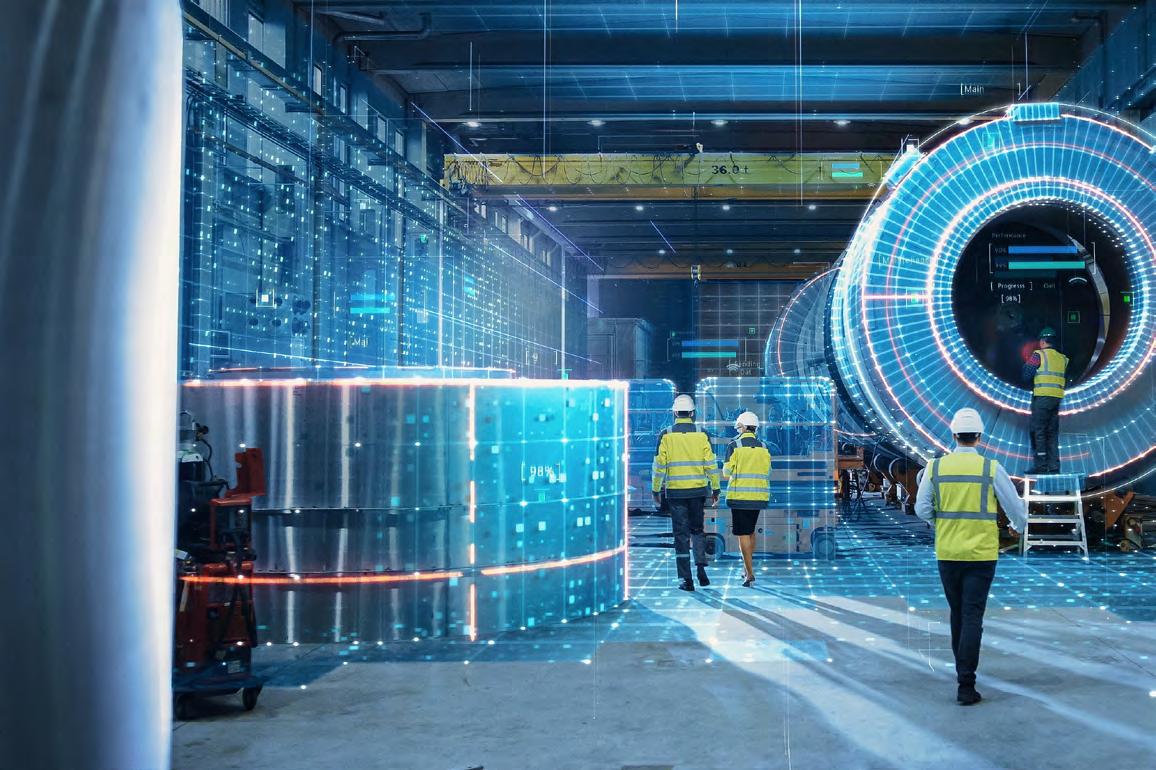
How logistics is becoming the silent scaffolding behind the GCC’s construction boom

As a member of Impact Innovation Board, Khadeeja merges creative strategy, emerging trends, and community building to drive transformation. With a Fine Art background and a passion for cultures, she crafts impactful narratives bridging startups, industry insights, and public-private sectors.
Words by: Khadeeja Hamid

Across the GCC, a new era of building is unfolding.
From Saudi Arabia’s NEOM and the Red Sea Project to the UAE’s vertical skyline and infrastructure surge, the region is laying more concrete, assembling more scaffolding, and pouring more foundations than ever before — but beneath the visible acceleration is a quieter choreography: the movement of materials, precise deliveries, off-site orchestration, and digital systems syncing it all in real time.
And this system, already complex,

is being pushed to its limits. It’s colliding with surging material costs, unpredictable shipping lanes, regulatory fragmentation, and the mounting expectation that everything — arrives not now, but yesterday. In a region where scale is the signature of progress, logistics has become the silent scaffolding holding it all together.
The GCC’s skyline ambitions are staggering in both scale and speed. By 2030, the region is expected to host over USD 2 trillion in active construction projects, with Saudi Arabia’s gigadevelopments accounting for more than half that value. These aren’t isolated builds — they’re ecosystems emerging in parallel. NEOM, the Red Sea Project, and Diriyah Gate are reshaping not just landscapes, but the logistical thresholds of what’s possible. Meanwhile, the UAE’s real estate rebound has translated into a flurry of luxury towers, waterfront enclaves, data centres, and green infrastructure rising all at once.
This isn’t just about building big. It’s about building faster than traditional
systems were ever designed for. With each contract awarded, a new layer of logistical complexity is introduced — not only in what gets built, but in how materials, machinery, and labour reach the ground. Every construction input has become a time-sensitive component in a tightly synchronised system. A delay in scaffolding, formwork, or material clearance can ripple through an entire schedule.
In this context, logistics isn’t peripheral. It’s fundamental — an operating system for an industry that now builds not just vertically, but simultaneously, across time zones, terrains, and expectations. And that system is being forced to evolve — fast.
Across the GCC, logistics providers are evolving from transporters to project partners — less about moving goods, more about managing momentum. Companies like Trukker are offering digital freight matching that allows developers to scale transport on demand. DP World and Abu Dhabi Ports are investing in inland logistics hubs to decongest ports and bring staging
closer to megaproject zones. Aramex, meanwhile, is expanding its integrated logistics offerings, bridging last-mile delivery with construction-specific services.
Modular delivery schedules, temporary pre-staging yards, mobile distribution hubs, and just-in-time logistics have become essential to managing the velocity of modern construction. Warehousing is no longer a static node — it’s flexible, dynamic, and often migratory, shifting closer to construction clusters as needed. Inland hubs are being developed to decongest ports and bring materials within reach of megaproject sites.
In Qatar, the run-up to the World Cup pushed infrastructure to its limits. Logistics firms responded by offering formwork kitting and prepping scaffolding systems off-site — streamlining set-up times and reducing congestion. Those methods are now being replicated at scale across NEOM’s early build phases in Saudi Arabia.
Logistics today isn’t about lorries and timetables. It’s about orchestration. Contractors working with advanced modular systems don’t want materials early — they want them exactly when needed. That requires deep forecasting: material flows mapped weeks in advance across subcontractors, borders, and build phases.
To meet this demand, logistics firms are turning to AI-driven planning, real-time route optimisation, and full-spectrum visibility platforms. These tools don’t just track — they anticipate, pre-empt, and re-route.
While formwork shapes concrete, data is reshaping logistics. The modern job site now depends on predictive logistics — where AI anticipates material flows before demand peaks, and supply chains respond in real time to on-site conditions.
Blockchain-based platforms like DP World’s CARGOES are enhancing traceability across every checkpoint, reducing customs delays and minimising mismatches in material type or quantity. IoT sensors embedded in delivery fleets and temporary storage units allow for real-time environmental monitoring — essential when transporting temperature-sensitive or time-critical components.
In high-rise and dense urban projects, vertical logistics is emerging as its own discipline — tracking crane cycles, optimising lift schedules, and managing floor-by-floor storage with surgical precision. Leading projects across the GCC are now creating digital twins of their logistics chains, simulating the full journey of formwork materials from port to crane. These models help contractors forecast unloading bottlenecks and
turnaround times before they disrupt timelines.
This isn’t a future scenario — it’s already being piloted in zones across Riyadh and Abu Dhabi. What’s emerging is a feedback loop between site and supply chain, where every movement is monitored, measured, and adjusted in real time. It’s logistics that thinks on its feet.
The future of construction logistics isn’t about faster lorries or bigger warehouses — it’s about smarter, selfaware ecosystems. The focus is shifting from scale to precision.
We’re already seeing the rise of micrologistics hubs near key megaproject zones, modular, reusable formwork — managed like inventory, not waste —
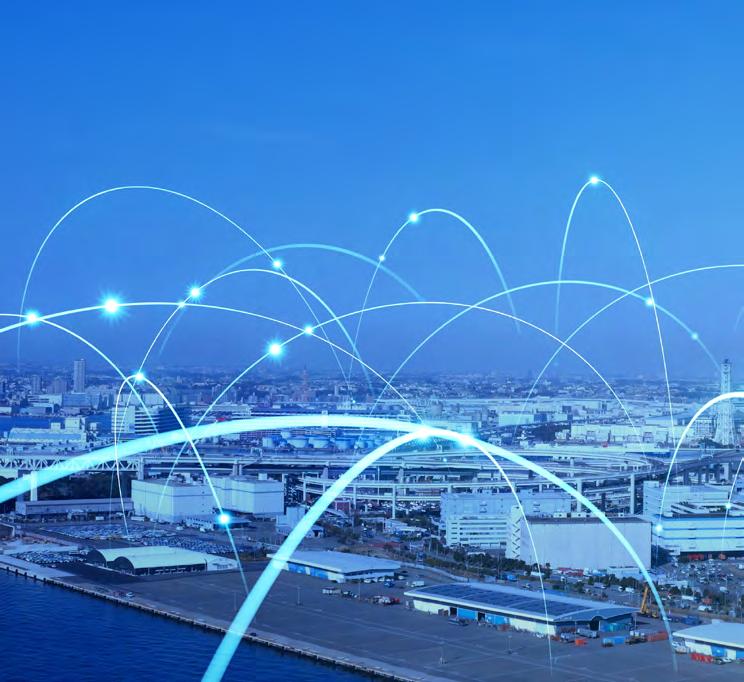
Inside a bustling GCC logistics zone, where tariff ripples reshape container movements and cost strategies
and digital twins that simulate supply chain routes for virtual testing before a single delivery is dispatched. These aren’t fringe innovations — they’re fast becoming industry standards.
Saudi Arabia’s Oxygen Port city, part of the NEOM vision, is being designed as a fully automated logistics hub, where materials and goods flow with minimal human intervention. In Dubai, logistics firms are now sitting at the table during early-stage project planning — not just to coordinate delivery timelines, but to co-design materials for transport efficiency and on-site assembly.
At the same time, sustainability is being woven into the logistics conversation — not as a separate initiative, but as part of overall performance. With construction ranking among the world’s highest carbon-emitting sectors, how materials move matters. Companies are piloting electric freight fleets, biofuelpowered lorries, and automated warehousing systems that reduce both emissions and inefficiencies.
There’s also a growing move towards urban consolidation centres — compact distribution hubs near dense construction clusters that enable micro-distribution of high-rotation items
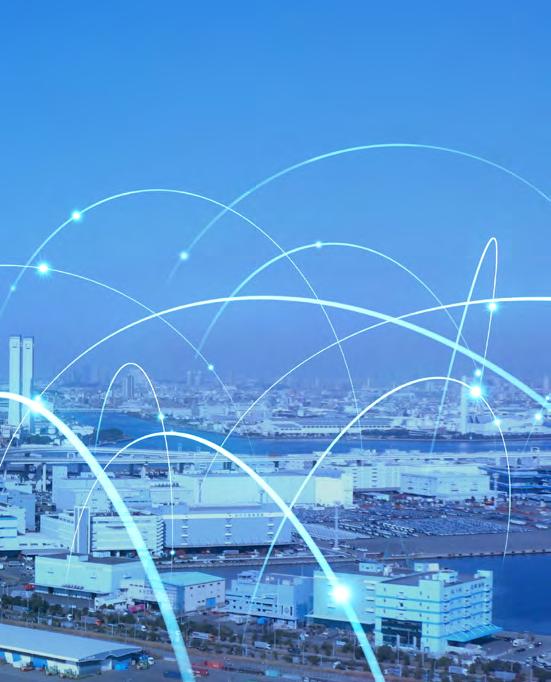
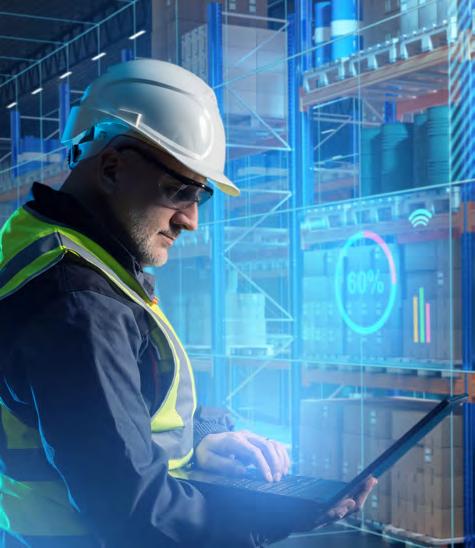
Behind every shipment is a story of resilience— navigating challenges, borders, and shifting tides
like scaffolding, reducing last-mile delays and easing urban congestion.
And then there’s digitisation. Platforms like CargoX and CARGOES by DP World are streamlining customs and documentation, transforming what used to be a paperchoked process into a frictionless digital workflow. In this new paradigm, a formwork shipment doesn’t wait three days for clearance — it’s verified, tracked, and approved in under 30 minutes.
The Infrastructure Behind the Infrastructure
We look at skylines and see progress — but rarely do we see what got them there. Not the drivers or dispatchers, not the systems engineers or digital networks. Logistics has become the invisible formwork of the GCC’s construction boom — holding everything in place, yet rarely seen.
As construction climbs higher and moves faster, the systems behind it must evolve just as rapidly. The region may be laying concrete and steel, but what it’s really building is the infrastructure behind the infrastructure — a logistics ecosystem that underpins every poured slab, every scaffolded floor, every crane on the horizon.
Because while construction builds what we see, it’s logistics that ensures it’s built at all.

How are real-world innovations transforming the way goods move across the global logistics landscape?
Words by: Aya Zhang
The logistics industry is often associated with slow-moving infrastructure— but some game-changing innovations are not only real, they’re already in use. From smart ports to autonomous packaging, here are some innovations you can actually see in action:
The Port of Rotterdam is at the forefront of digital transformation, aiming to enable autonomous shipping by the year 2030. Collaborating with IBM, Esri, Cisco, and Axians, the port is developing a digital twin, a virtual replica of the port’s physical infrastructure and operations. This initiative involves deploying a vast network of sensors throughout the port to collect
real-time data on various parameters such as vessel movements, weather conditions, and infrastructure status.
2. Cainiao’s Smart Lockers with Facial Recognition
Cainiao, Alibaba’s logistics arm, has implemented smart lockers across China that utilise facial recognition technology for secure parcel retrieval. These lockers are designed to prevent unauthorized access, ensuring that only the intended recipient can collect the package.
3. Ocado’s AI-Driven Fulfillment Centers
UK-based online grocery retailer Ocado continues to advance its
automated fulfilment centers, employing AI and robotics to streamline order processing. These facilities utilise a gridbased system where robots autonomously pick and pack grocery items, significantly reducing human labor and increasing throughput.
These aren’t just concepts— they’re operational innovations transforming how goods move and how companies think about logistics. As the Middle East continues to invest in infrastructure and sustainability, adopting tangible, proven technologies like these will be critical for resilience and growth in a competitive global market.


